The history of Poland from 1939 to 1945 encompasses primarily the period from the invasion of Poland by Nazi Germany and the Soviet Union to the end of World War II. Following the German–Soviet non-aggression pact, Poland was invaded by Nazi Germany on 1 September 1939 and by the Soviet Union on 17 September. The campaigns ended in early October with Germany and the Soviet Union dividing and annexing the whole of Poland. After the Axis attack on the Soviet Union in the summer of 1941, the entirety of Poland was occupied by Germany, which proceeded to advance its racial and genocidal policies across Poland.
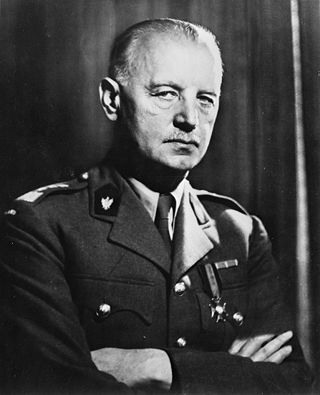
Władysław Eugeniusz Sikorski was a Polish military and political leader.

The Polish Workers' Party was a communist party in Poland from 1942 to 1948. It was founded as a reconstitution of the Communist Party of Poland (KPP) and merged with the Polish Socialist Party (PPS) in 1948 to form the Polish United Workers' Party (PZPR). From the end of World War II the PPR led Poland, with the Soviet Union exercising moderate influence. During the PPR years, the centers of opposition activity were largely diminished, and a socialist system was established in the country.

The Polish government-in-exile, officially known as the Government of the Republic of Poland in exile, was the government in exile of Poland formed in the aftermath of the Invasion of Poland of September 1939, and the subsequent occupation of Poland by Germany, the Soviet Union, and the Slovak Republic, which brought to an end the Second Polish Republic.
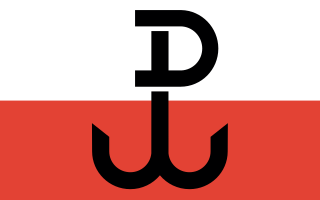
The Polish Underground State[a] was a single political and military entity formed by the union of resistance organizations in occupied Poland that were loyal to the Government of the Republic of Poland in exile in London. The first elements of the Underground State were established in the final days of the German and Soviet invasion of Poland, in late September 1939. The Underground State was perceived by supporters as a legal continuation of the pre-war Republic of Poland that waged an armed struggle against the country's occupying powers: Nazi Germany and the Soviet Union. The Underground State encompassed not only military resistance, one of the largest in the world,[b] but also civilian structures, such as justice, education, culture and social services.

The Government Delegation for Poland was an agency of the Polish Government in Exile during World War II. It was the highest authority of the Polish Secret State in occupied Poland and was headed by the Government Delegate for Poland, a de facto deputy Polish Prime Minister.
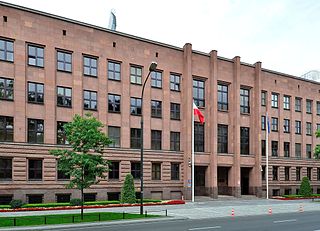
The Ministry of Foreign Affairs is the Polish government department tasked with maintaining Poland's international relations and coordinating its participation in international and regional supra-national political organisations such as the European Union and United Nations. The head of the ministry holds a place in the Council of Ministers.
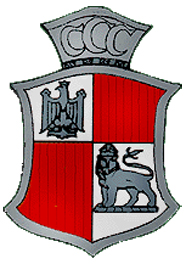
No. 300 (Polish) Bomber Squadron "Land of Masovia" was a Polish bomber squadron formed in Great Britain as part of an agreement between the Polish government-in-exile and the United Kingdom in 1940. It was one of 15 squadrons of the Polish Air Force in exile that served alongside the Royal Air Force in World War II. It was disbanded in 1947. 300 Squadron is now represented by 300 Squadron of the Royal Air Force Air Training Corps, which made the alliance with the Polish Air Force is 1994.

General Stanisław Kopański was a Polish military commander, politician, diplomat, an engineer and one of the best-educated Polish officers of the time, serving with distinction during World War II. He is best known as the creator and commander of the Polish Independent Carpathian Brigade and Polish 3rd Carpathian Infantry Division.

The Provisional Government of National Unity was a puppet government formed by the decree of the State National Council on 28 June 1945 as a result of reshuffling the Soviet-backed Provisional Government of the Republic of Poland established by the Polish Workers' Party through inclusion of politicians from the close political sphere of Stanisław Mikołajczyk, the former prime minister of the Polish government-in-exile based in London. Inclusion of the latter group provided an excuse for the Western allies to approve tacitly the fait accompli of Poland becoming part of the Soviet sphere of influence, and to legitimise the Warsaw government while withdrawing their recognition of the Polish government-in-exile.

Janusz Bokszczanin was a colonel of the Polish Army and one of the first Polish commanders of the motorized troops in the reborn Second Polish Republic. During World War II he joined the ZWZ resistance organization and later the Home Army. Until 1943 he served as chief of department of rapid response within its headquarters. In 1944, prior to the anti-Fascist Operation Tempest, he became the chief of operations, and deputy chief of staff of the entire Home Army (AK).

August Zaleski was a Polish economist, freemason, politician, and diplomat. Twice Minister of Foreign Affairs of the Republic of Poland, he served as President of Poland-in-exile.
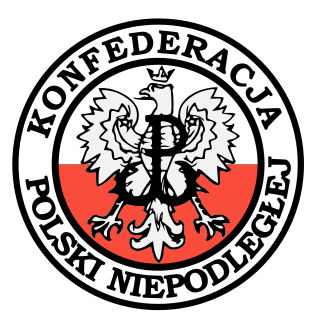
Confederation of Independent Poland was a Polish nationalist political party founded on 1 September 1979 by Leszek Moczulski and others declaring support for the pre-war traditions of Sanacja and Józef Piłsudski.

The Polish Armed Forces in the West refers to the Polish military formations formed to fight alongside the Western Allies against Nazi Germany and its allies during World War II. Polish forces were also raised within Soviet territories; these were the Polish Armed Forces in the East.

The Czechoslovak Army was the name of the armed forces of Czechoslovakia. It was established in 1918 following Czechoslovakia's declaration of independence from Austria-Hungary.

The Provisional Council of State was the first government of the Kingdom of Poland, a new state created by the military authorities of Germany and Austria on some Polish lands during the First World War.

No. 309 "Land of Czerwień" Polish Fighter-Reconnaissance Squadron was a Polish squadron formed in Great Britain as part of an agreement between the Polish Government in Exile and the United Kingdom in 1940. It was one of 15 squadrons of the Polish Air Force in exile that served alongside the Royal Air Force (RAF) in World War II. It was at first a reconnaissance squadron, and later converted into a fighter squadron. It was named after the region around the city of Czerwień; which was then in southeastern Poland, and is now in western Ukraine.
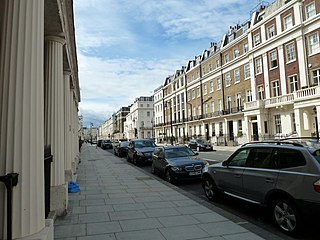
Eaton Place is a street in London's Belgravia district.
This page is based on this
Wikipedia article Text is available under the
CC BY-SA 4.0 license; additional terms may apply.
Images, videos and audio are available under their respective licenses.















